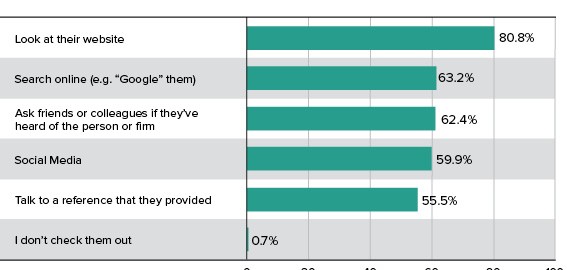Many professional services firms generate at least some proportion of their leads online. But what many of these firms do not realize is what they’re missing.
Our research shows that firms investing in marketing techniques that allow them to generate leads online are benefitting in a big way. Firms that generate at least 40% of their leads online grow 4x faster and firms that generate at least 60% of their leads online are 2x more profitable.
That’s a big difference. If you’re not getting a sizable amount of leads online, including from your website, then you’re leaving opportunities on the table.
What’s missing is usually a combination of two things: website traffic and credibility. We define a firm’s brand as the combination of its reputation and visibility. So it makes sense that if one or both of these factors are off, then it will affect your ability to drive leads—and that ultimately affects your bottom line.
But there’s no need to fret. You can fix both of these concerns.
Boosting Your Firm’s Website Traffic
You don’t need to pay a lot of money to out advertise your competition, nor do you need to outsmart Google. (Actually, the latter could get you into serious trouble in the long run.)
You can drive traffic to your website, and therefore awareness of your firm, by providing content that positions you as the authority on a given subject matter that your prospective buyers search for when looking for a new provider like you.
Don’t focus on generic terms like “architecture” or “accounting” because you’ll never win that keyword battle and the leads you’d get for that likely won’t be qualified.
Instead, focus on more specific searches of the issues that your clients face and something you have expertise in such as “bio-med laboratory space planning” or “financial ramifications for large mergers.”
Note that these search terms don’t actually say, “architecture” or “accounting.” Buyers are looking for professionals that can solve their problems, guide them through unknown pitfalls, and provide them a clear road map. They’re looking for what we call Visible Experts℠ — or at the firm level, Visible Firms℠.
Why is website traffic so important to professional service firms? Our research shows that 80.8% of buyers look at a firm’s website before making a purchasing decision.

By providing content about your clients and prospective clients’ issues and challenges, you not only increase your likelihood of being found online, but you also increase the likelihood that searcher wants to talk to you.
Building Your Firm’s Credibility
No sense driving lots of traffic to your website if you’re just going to scare visitors away. If visitors don’t quickly and easily find the information they’re looking for, they won’t stick around.
Web developers cite a rule of 7 seconds you have to get someone to stay on your website. Yes, people will make a gut decision whether to read more about your firm or to abandon your website within 5-7 seconds. It’s a daunting statistic, but you probably do it too.
When you’re the buyer, you search online and make quick decisions about whether a company fits what you’re looking for. This is often true for both products and services. Don’t turn a blind eye to how buyers buy when it comes to your firm’s website.
Look at your website objectively or get outside opinions. What’s the first impression that your website makes? Is it enough to hook someone and encourage them to stay and learn more?
Your website needs to project your firm as a credible source and industry leader. Old, dated, and poorly designed websites portray a company that can’t afford something nicer, doesn’t keep up with technology, or just does not care about new clients. I’m sure you do not want to be considered any of these descriptions.
Secondly, your website needs to showcase your expertise, address prospects’ challenges, and educate them on unforeseen challenges. Your website should clearly communicate how you can help.
Remember that great real estate agent that held you by the hand the first time you bought a house? Be that person, not the horror story that people vent about online.
Why Should You Care?
Your prospective clients are going to your website and making a judgment call about your firm, whether you like it or not. They are either qualifying or disqualifying you.
In the architecture, engineering, and construction industries that I work in, many companies are not making the short list for a project that they know nothing about because the buyer is disqualifying them before even speaking to them.
Instead of contacting 20+ firms to do proposals, they’re making a list of 5-8 firms they’d like to see proposals from to save themselves time and effort. If your phone doesn’t ring like it used to, this is probably happening to your firm too.
Showcasing your expertise also makes it easier to close leads because you’ve already proven yourself as the expert, built trust, and your prospect has qualified themselves through your content. They also feel like they know you even before they ever engage you because they’ve been interacting with you through your blog, articles, book, and presentations.
The traditional sales tactics that we learned years ago where we must establish a connection and build trust no longer have to be done in person. Instead, your content does this for you.
If you haven’t experienced it before, it can be odd to think about it this way. Think of the presenters you’ve enjoyed and learned from. When you need their services, you contact them first because you “know” them, they’ve built trust with you, and they’ve shown that they are credible.
All this was done by talking to a group of people, not you individually. This is how your prospects should engage you online and offline.
This works for B2B marketing because the way buyers look for professional services firms is changing. Generating referrals doesn’t happen over lunch, cocktails, and golf outings anymore. Buyers now look online and even ask colleagues for recommendations online.
This change is not just because buyers are getting younger. It is also evolving because people are busy and we live in a culture where the answers to nearly everything are just a search away. Utilizing content marketing, you can be what people find when searching for the solutions you provide.
A halo effect also happens with content where you get numerous fans of your firm and yourself, even from non-clients. It might amaze you that 81.5% of service providers have received referrals from people they have not worked with. In the same research study, we also found that about 52% of respondents have ruled out a referral before they ever contacted the firm they were referred to.
So, is your website attracting new business or scaring away leads and potential referrals?
Digital & Social Articles on Business 2 Community
(104)
Report Post





